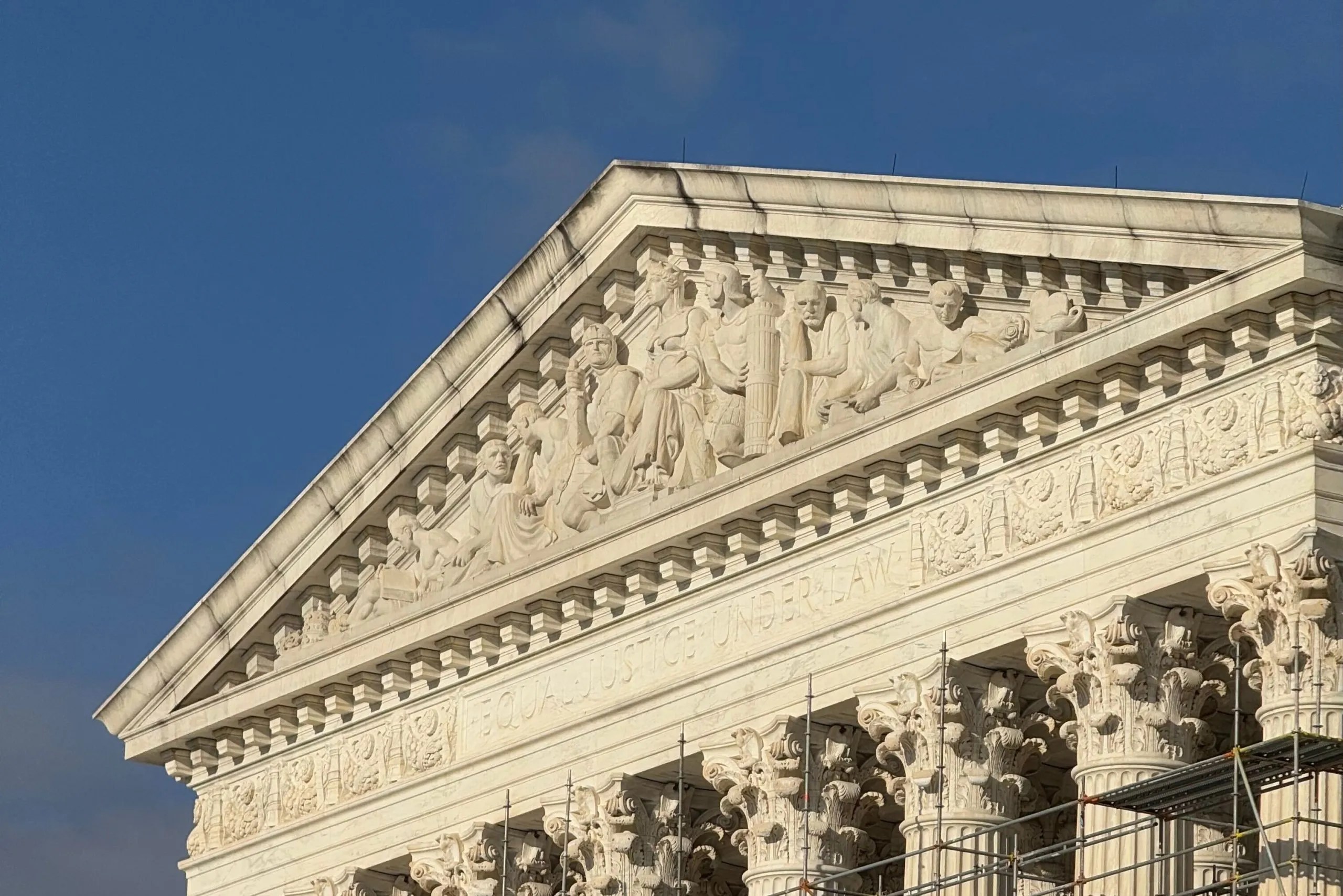SCOTUStoday for Thursday, November 20


The SCOTUSblog team reads a lot of legal news each week. Here’s the most memorable headline from the past few days: Go fetch! Judge orders exes to bid on beloved goldendoodle.
SCOTUS Quick Hits
- Former Justice Stephen Breyer is scheduled to speak to students at Suffolk University in Boston this morning. The event is closed to the public.
- Tomorrow, the justices will take part in a private conference, where they will discuss cases and vote on petitions for review.
- Mark your calendars: SCOTUSblog will be hosting a live blog during the oral argument in Trump v. Slaughter on Monday, Dec. 8. The live blog will begin at 9:30 a.m. EST.
Morning Reads
- Opposition to tariffs is widespread but few Americans expect the Supreme Court to strike them down (Taylor Orth, YouGov) — A new survey from YouGov investigated how Americans view trade and the Supreme Court case on President Donald Trump’s signature tariffs. The survey showed that more Americans expect the court to “allow Trump’s tariffs to stand than expect it will strike them down (42% vs. 25%).” There was a partisan gap on this question, with 34% of Democrats saying that the court “probably will strike down Trump’s tariffs” compared to 18% of Republicans.
- Appeals court panel rejects Trump’s ‘Big Lie’ defamation lawsuit against CNN (Kyle Cheney and Josh Gerstein, Politico) — On Tuesday, a three-judge panel on the U.S. Court of Appeals for the 11th Circuit held that Trump’s defamation lawsuit against CNN cannot continue because CNN’s challenged behavior is protected by the First Amendment. Trump had been seeking to hold the network accountable for using the phrase “Big Lie,” which is “often associated with Adolf Hitler,” in coverage of his “false claims of fraud in the 2020 election,” according to Politico. “Trump could ask the full bench of the 11th Circuit to rehear the case or appeal to the Supreme Court. A spokesperson for Trump’s legal team signaled the president would appeal, saying he ‘will pursue this case against CNN to its just and deserved conclusion.'”
- Trump administration prevails in appeal over tear gas tactics in Chicago (Diana Novak Jones, Reuters) — The U.S. Court of Appeals for the 7th Circuit on Tuesday “blocked a judge’s order that had restricted how ICE agents could use tear gas and other weapons on people protesting immigration crackdowns in Chicago,” according to Reuters. The pause is in effect at least until the court “more fully review[s]” the order, which, according to the Trump administration, led to impermissible micromanagement of federal law enforcement officers. This dispute over the activities of federal immigration agents is taking place as the Supreme Court considers whether Trump can deploy the National Guard to Chicago.
- Texas judge temporarily blocks law requiring Ten Commandments in schools (Michelle Watson, CNN) — On Tuesday, a federal judge in Texas “issued a preliminary injunction requiring certain Texas public school districts to remove displays of the Ten Commandments,” holding that the displays violate the First Amendment’s establishment clause, according to CNN. “It is the latest victory in a series of legal challenges to laws requiring public schools to display the Ten Commandments” in Texas, Arkansas, and Louisiana. “Legal experts have said it’s likely the cases will eventually reach the US Supreme Court.”
- Just Announced: ‘Heroes of 1776’ by Supreme Court Justice Neil Gorsuch (Iyana Jones, Publishers Weekly) — Last week, Justice Neil Gorsuch announced that he’s working on a children’s book about the Declaration of Independence during an interview with Fox News. On Tuesday, Publishers Weekly shared more details about the project. “Heroes of 1776: The Story of the Declaration of Independence will cover many influential figures in the creation of the founding document, ranging from George Washington and Benjamin Franklin to lesser-known figures such as Caesar Rodney and Thomas Paine.” The book “will hit shelves on May 5, 2026.”
A Closer Look: Upcoming Petitions for Review
The justices will next consider petitions for review at a private conference on Friday. Several such cases can be found on our petitions page, which highlights particularly notable disputes awaiting the Supreme Court’s attention.
Here’s a closer look at three of the issues that will be in front of the justices tomorrow.
Birthright citizenship
Last term, the court weighed in on a case stemming from President Donald Trump’s executive order on birthright citizenship without considering the merits of that order. Instead, the justices addressed the universal injunctions used to put the order on hold nationwide and held that federal district courts lacked the authority to issue such injunctions.
Now, the court has been asked to directly consider whether birthright citizenship is guaranteed by the Constitution. The Trump administration raised that issue in two nearly identical petitions filed at the end of September, contending that the 14th Amendment’s citizenship clause “was adopted to grant citizenship to newly freed slaves and their children—not to the children of temporary visitors or illegal aliens.”
The respondents in the cases, including families who claim they would be affected by the order and a group of states, have argued that the administration is misinterpreting the 14th Amendment and overlooking related federal laws and Supreme Court precedent. They’ve urged the court to deny review and, in that way, prevent the order from taking effect.
Voting Rights Act
Last month, the court heard a second round of oral arguments in Louisiana v. Callais and considered whether intentionally creating majority-minority congressional districts to satisfy Section 2 of the Voting Rights Act violates the 14th or 15th Amendments. A majority of justices appeared ready to curtail Section 2, which outlaws discrimination in voting practices, by potentially making it harder to bring a Section 2 claim, as SCOTUSblog reported at the time.
On Friday, the justices will weigh several petitions for review raising the same or similar questions about Section 2 of the VRA as Callais. But unlike Callais, they ask whether Section 2 allows lawsuits by private plaintiffs.
In a brief opinion concurring in a 2021 decision on Arizona voting provisions, Justice Neil Gorsuch, joined by Justice Clarence Thomas, noted that the court in several cases has assumed that private plaintiffs may bring such a suit, but has never decided this issue.
Parental rights
In Foote v. Ludlow School Committee, which was described by Amy in recent piece, the justices have been asked to consider parental rights in public schools by a Massachusetts couple who contend that school officials encouraged their middle-school-aged child to adopt a new gender identity without their knowledge or consent. Such actions violate the right of parents to direct their child’s upbringing and education, they said, as well as their right to make medical and mental health decisions for their child.
School officials have urged the court not to take up the case, stating that the teachers’ actions did not stem from formal guidance of the Ludlow School Committee. Rather, the court should wait to weigh in on parental rights in public schools until a dispute presents “actual school district policies” that can be addressed, they wrote.
When the court turned down a similar appeal last month, Justice Samuel Alito wrote a statement, joined by Thomas and Gorsuch, in which he acknowledged that denying review was the correct decision but described policies “that purposely interfere with parents’ access to critical information about their children’s gender identity choices and school personnel’s involvement in and influence on those choices” as of “great and growing national importance.”
SCOTUS Quote
“Our Court certainly has no machinery with which to take a Gallup Poll.”
— Justice Hugo Black in Griswold v. Connecticut
On Site
From Amy Howe
Last month, the Supreme Court turned down an appeal from a group of Colorado parents who argued that a school district interfered with their parental rights when it left them out of discussions about their children’s gender identity. On Friday, the justices will consider a similar request from a Massachusetts couple who contend that school officials not only socially transitioned their middle-school-aged child over their objections but also hid that fact from them. Read Amy’s analysis on parental rights in public schools to learn about what the Supreme Court has said about this topic in past cases.
Contributor Corner
Birthright Citizenship and American Exceptionalism
In his latest Immigration Matters column, César Cuauhtémoc García Hernández addressed one of the Justice Department’s contentions concerning President Donald Trump’s executive order on birthright citizenship: that it would bring the United States in line with the modern global trend. “It is true that most countries do not grant citizenship at birth to people born within their borders with as few restrictions as the United States,” he wrote. “But that isn’t new: The United States has been a global outlier since the 14th Amendment was added to the U.S. Constitution in 1868.”
Posted in Featured, Newsletters